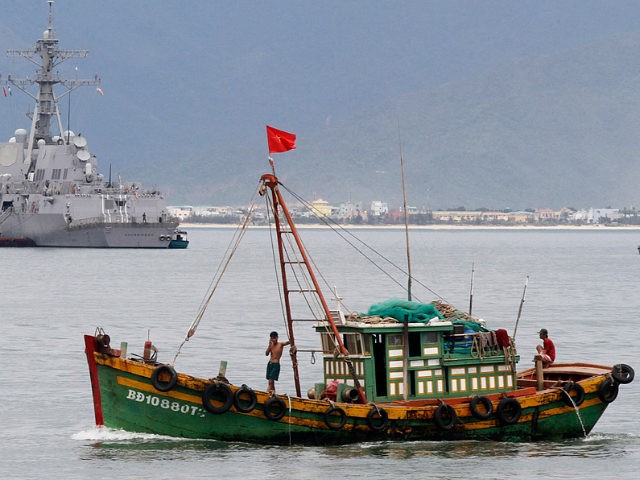The government of Vietnam has condemned China for imposing a fishing ban over its territory in the Paracel Islands, a South China Sea archipelago that China illegally claims as its own.
The Chinese Ministry of Agriculture announced a ban last week on fishing in multiple regions of the South China Sea, including the Gulf of Tonkin and the waters of Vietnam’s Paracel Islands. Between May 1 and August 16, the Chinese Coast Guard will prevent Vietnamese fishermen from exploiting the resources within Chinese sovereign territory.
The Vietnamese Foreign Ministry has condemned the move as a serious violation of the nation’s sovereignty. “Vietnam resolutely opposes and rejects the regulation issued by China,” Foreign Ministry spokesman Le Hai Binh said last week. According to the English-language regional outlet Vietnam Net, Binh added that Vietnam “has sufficient legal ground and historical evidence affirming its sovereignty over Hoang Sa (Paracel) archipelago as well as legitimate rights over its waters in line with the 1982 United Nations Convention on the Law of the Sea (UNCLOS).”
This week, Hanoi announced it would send surveillance ships to the affected area to protect its fishermen, who have come under attack by Chinese Coast Guard ships in the past.
The Chinese government claims most of the South China Sea, including the sovereign waters of Vietnam, the Philippines, Taiwan, Brunei, Malaysia, and Indonesia. The South China Sea is among the world’s most highly-trafficked trade routes and a natural resource believed to hold as many as 11 billion barrels of oil. Most recently, satellite images revealed that China was preparing military bases to install long-range missiles in South China Sea’s international waters.
The Permanent Court of Arbitration at the Hague ruled last year that China’s claims were invalid and its activities in the disputed territories illegal. The Chinese government vowed to disregard the ruling, deeming it the result of a conspiracy between Japan (which is not a claimant in the South China Sea) and the United States. Since then, China has continued to construct artificial islands and install military assets in Vietnamese and Philippine waters in the region.
China has used force against Vietnam more than any other South China Sea rival. In 2014, Chinese ships sunk a Vietnamese fishing vessel in Vietnamese waters, claiming the fishermen had “forcefully intruded into the area of a Chinese company’s oil rig and capsized” rather than being sunk. A year later, A Chinese ship rammed itself into another Vietnamese ship until it sank, leaving the entire crew floating on lifeboats in the middle of the South China Sea until Vietnamese rescue teams saved them. At the time, regional Fisheries Association head Phan Huy Hoang claimed at least twenty similar incidents in which Chinese ships attacked Vietnamese counterparts in Vietnamese waters.
In an attempt to repair increasingly tense relations between the fellow Communist countries, Vietnamese Communist Party chief Nguyen Phu Trong visited Beijing in March 2016, meeting with President Xi Jinping. The meeting did not result in a statement on the South China Sea, with Xi instead stating, “China and Vietnam share a common destiny, so do the Communist Party of China and the Communist Party of Vietnam.” The meeting triggered widespread protests against Chinese belligerence in the South China Sea among Vietnamese citizens in Hanoi.
A month after that meeting, Vietnamese Coast Guard officials seized a Chinese ship in the Vietnamese waters of the Gulf of Tonkin, where China imposed its fishing ban this week.
China’s latest aggression has triggered reactions from other countries in the region. Taiwan — which China considers a breakaway province, not a sovereign nation — announced this week that it would increase the number of South China Sea navy patrols in its schedule, in part to protect civilian Taiwanese activities in the region. Voice of America notes that Taipei has sent a 1,000-ton coast guard frigate to the region to protect fishing operations in the region.
The United States has also announced it would increase the number of “freedom of navigation” operations in the region to protect its allies. The U.S. Navy has already begun “routine operations” in the international waters of the sea, which China claims exclusively as its own. “We are consistently opposed to relevant countries threatening and damaging the sovereignty and security of littoral countries under the flag of freedom of navigation and overflight,” Chinese Foreign Ministry spokesman Geng Shuang said of operations.

COMMENTS
Please let us know if you're having issues with commenting.